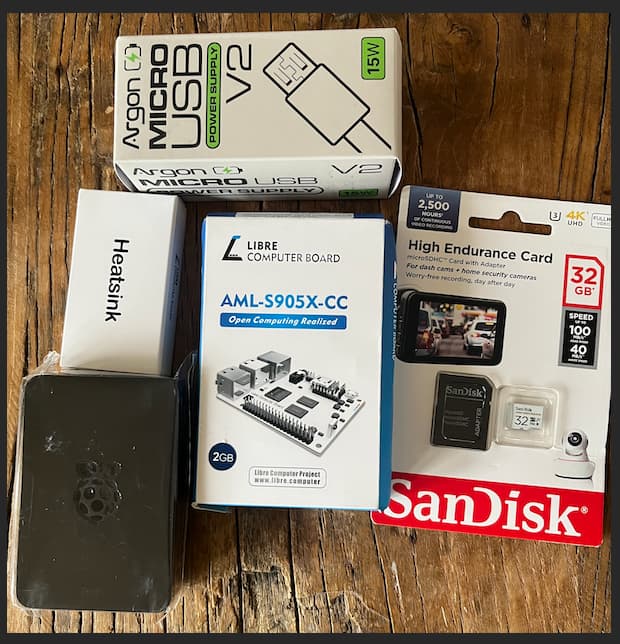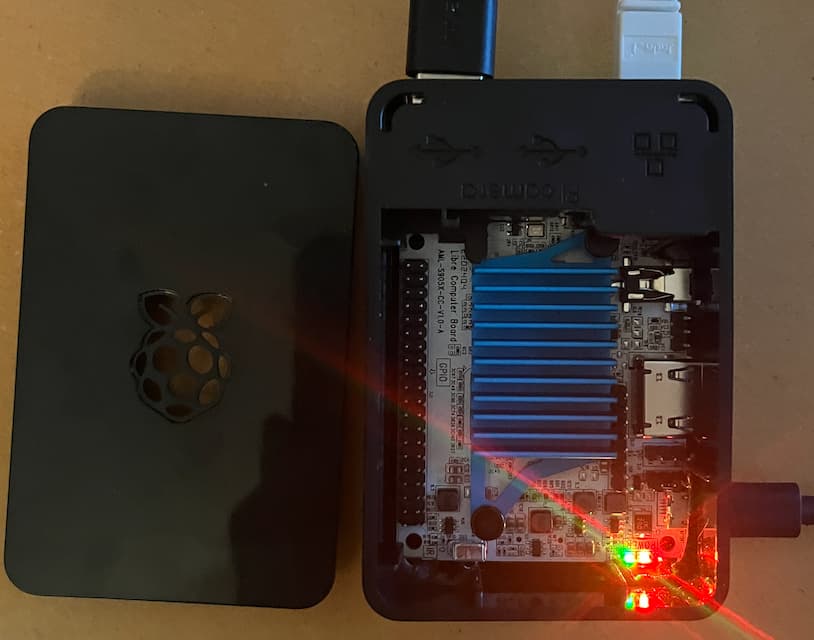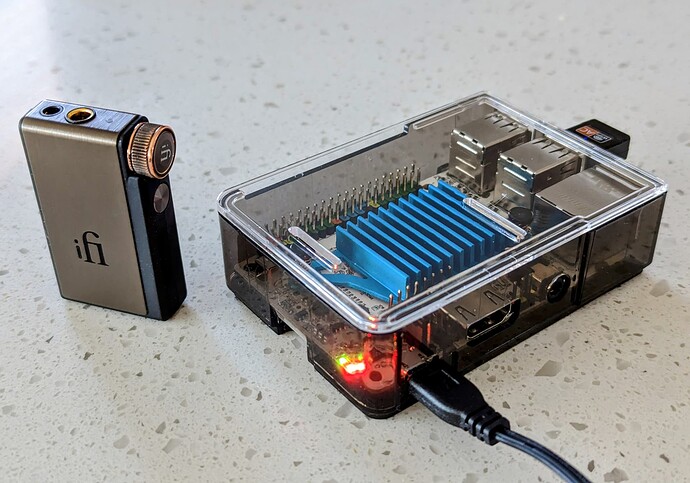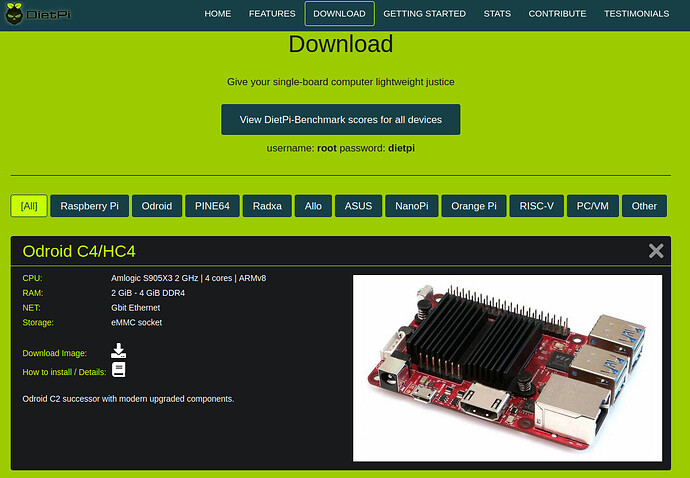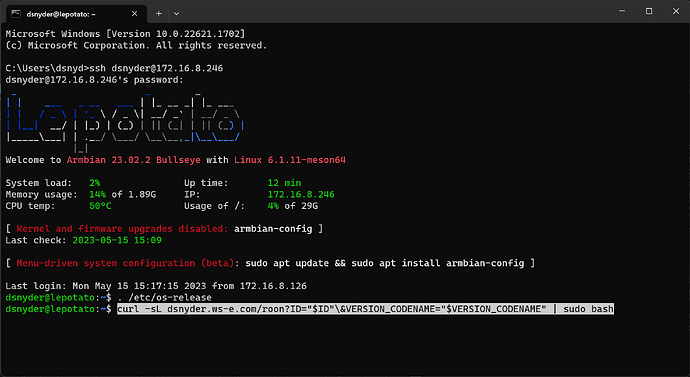Yikes! Sorry David, I did not realize autocorrect foiled me. It’s not “hostage”, it’s “hostapd”.
Ah. No maches so far for that either:
$ sudo grep -Ri hostapd /var/log
/var/log/auth.log:May 11 19:59:58 lepotato sudo: dsnyder : TTY=pts/0 ; PWD=/home/dsnyder ; USER=root ; COMMAND=/usr/bin/grep -Ri hostapd /var/log
Got it up and running on my first try! I’ve never used linux before so needed a bit more assistance along the way (i’m sure you’ll cover this in the video) starting with which version of Armbian to download - I picked CLI at random. The other thread linked above was helpful in setting up the initial user/password and updates. Only issue was the RPi case I bought wasn’t compatible without having to remove a bunch of the internal plastic bits first.
I’ll miss the Airplay compatibility with Ropiee/DietPi but otherwise this seems like a carbon copy streamer. One remaining question is how do I turn the unit off? Just unplug it? Putting the IP address in my browser doesn’t connect to a UI like it does with Ropiee.
Actually, give this a try:
Find the index for the soundcard that you want to use with AirPlay:
$ aplay -l
**** List of PLAYBACK Hardware Devices ****
card 0: LIBRETECHCC [LIBRETECH-CC], device 0: fe.dai-link-0 (*) []
Subdevices: 1/1
Subdevice #0: subdevice #0
card 1: Pro [Tone2 Pro], device 0: USB Audio [USB Audio]
Subdevices: 0/1
Subdevice #0: subdevice #0
In this case, I want card #1 because that’s my USB DAC.
Next, create a new file called /etc/asound.conf with lines like these:
defaults.pcm.card 1
defaults.ctl.card 1
Here, I chose “card 1” because that matches the index of the card I want AirPlay to use.
Finally, install the AirPlay software:
$ sudo apt install shairport-sync
Once you’ve done this, you should be able to stream via AirPlay as usual. Let me know how it goes.
Kelly, I tried running the command you suggested during install on my potato and got the following message:
Failed to disable unit: Unit file hostapd.service does not exist.
I’ll keep an eye out for any issues after extended runtime.
Unbelievable - this worked!
Took a bit of googling to figure out how to create the file correctly. Total noob here.
For the benefit of anyone following this thread in the future here’s what I did:
$ cd /etc
$ sudo nano asound.conf
Typed the following two lines in the text editor (after verifying that card 1 was connected to my DAC using the $aplay -l command):
defaults.pcm.card 1
defaults.ctl.card 1
^X to exit and save
$ sudo apt install shairport-sync
$ sudo reboot
Boom!
Wow!! Worked like a champ!! Knowing no Linux I had to Google a few things, but got it! Thank you so much. I just assumed this was a no go.
I love the teamwork on this thread. Nice work, guys!
My case finally came in from PiShop.US.
Pretty simple, but I like it. I had to use mini screwdriver to pry one of the clips back a smidge to get the board to pop in. CPU temperature is 3 degrees (C) warmer with it in the case, but that’s to be expected. Stays comfortably below 60’C even while streaming at maximum bandwidth (32-bits, 768 kHz), so I’m not worried about adding a fan.
My second board should arrive on Monday, so I’ll schedule a YouTube video sometime next week. Watch for the link in this channel.
Odroid C4 is now supported by RoPieee and pretty widely available.
Well supported by DietPi too.
Very good alternative to RPi
Is there a supported display as well?
Not sure, jump in the Ropieee section and ask the dev directly
That’s good to know. Thanks for passing along the good news. At $85, it’s a little spendy compared to $30/$35 for the Libra Computer board. But still less than what scalpers are asking for a Raspberry Pi 4.
Update:
I’ve written a little script that may help some folks with the setup process. You still have to flash your microSD card using Belina Etcher (or similar). Just use the Armbian Bullseye Minimal CLI image from the same page instead. At current writing, it’s 344 MB instead of 588 MB for Jammy, but, more importantly, @Wade_Kincaid discovered that CPU usage is significantly lower with Bullseye (Debian packages) than Jammy (Ubuntu packages). I was able to confirm his findings, so big thanks go to Wade for his efforts!
Once you have booted your board with Armbian Bullseye and have it connected to your home network, you can complete setup for Roon by executing these two commands:
. /etc/os-release
curl -sL dsnyder.ws-e.com/roon?ID="$ID"\&VERSION_CODENAME="$VERSION_CODENAME" | sudo bash
I realize that the second command is a bit long to type, but if you can login to your Le Potato board using SSH (from the Command Prompt in MS Windows or Terminal in Apple macOS), you should be able to just copy/paste those two commands. For example:
If you just want to see what the script does without running it, you can run this command:
curl -sL dsnyder.ws-e.com/roon?ID=debian\&VERSION_CODENAME=bullseye
I plan to add support for more O/S versions soon, including Jammy, but so far, I’ve only had time to test with Bullseye. If you decide to give this a try, I welcome feedback either on this thread or via PM. Cheers, and happy Potato baking, everyone! ![]()
That’s good. I don’t know why the installer enabled it on my Renegade and not on the Potato…. But it would have been an issue for me had I not had some experience with Linux.
At the risk of feeping creaturism, I’ve added the ability to enable (or disable) AirPlay to my script. To enable:
. /etc/os-release
curl -sL dsnyder.ws-e.com/roon?ID="$ID"\&VERSION_CODENAME="$VERSION_CODENAME"\&AIRPLAY=enable | sudo bash
Unimaginatively, to disable AirPlay:
. /etc/os-release
curl -sL dsnyder.ws-e.com/roon?ID="$ID"\&VERSION_CODENAME="$VERSION_CODENAME"\&AIRPLAY=disable | sudo bash
If you don’t specify the AirPlay parameter, the script won’t make any changes.
The script also attempts to detect if you have a USB DAC connected. If so, it makes the DAC the default sound card for AirPlay. If you don’t hear sound, try rebooting or restarting shairport-sync with something like this:
sudo systemctl restart shairport-sync
Here’s a somewhat long-winded video walking through the build process. Use the links an index in the video description to navigate around parts you are familiar with. I hope this helps more folks here get started with the hows and whys behind this project. ![]()
Thanks @David_Snyder for the terrific instructions. I really appreciate your time to do this. I followed along and had my potato fully baked in no time. For anyone else using WiFi, the only think I did differently was to use an adapter with a 5dBi antenna. I know from experience to stick with Realtek, so I went with this one: Realtek RTL8812BU USB Wireless Adapter 1200 Mbps with 5 dBi Antenna Dual Band AC1200 WiFi Dongle.
Thanks again!
Ryan
Hi @Ryan_Hart1. I’m glad things worked out for you. I keep hearing that the Raspberry Pi shortage will soon be over, but stock remains basically empty at my favorite RPi watering hole. I mean, you could use the Pi 400 to build a Roon endpoint for $100 or less, but it would be pretty bulky. LOL.
Thanks for sharing a link to a specific Realtek adapter with antenna that works. I’m sure others will find this helpful too!
